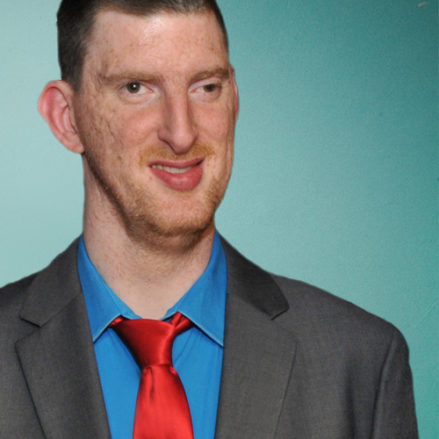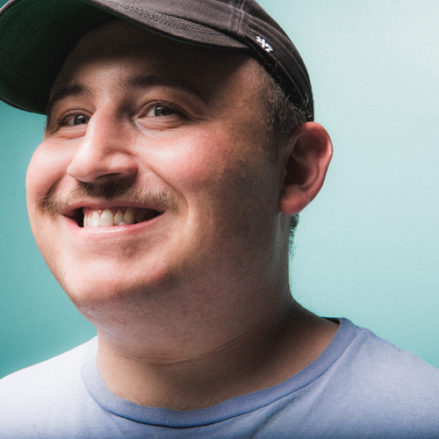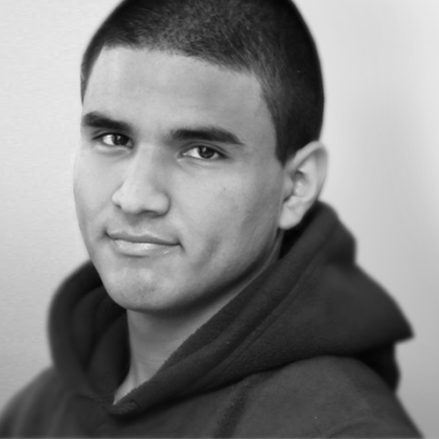What do you think it takes for someone to work in theatre?
Immediate answers that might come to mind include an interest in drama, interpersonal skills, great communication, and an interest in learning new things. Thousands of people meet these qualifications – but how often do you encounter a person with disabilities working at the theatre?
People With Disabilities Working in Theatre
One of Independent Futures’ participants, Sarah, was working with a job coach from Jewish Vocational Services when she earned an apprenticeship with Piven Theatre. After exploring what Sarah might like to do for employment, Sarah’s job coach helped her get in touch with Piven Theatre.
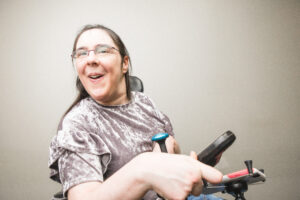 Together, the pair went over tips and what to expect in informational interviews. Sarah’s dream job was to be an assistant teacher. “The best I thought I could shoot for was taking tickets,” Sarah said. But then, her informational interview took a positive turn.
Together, the pair went over tips and what to expect in informational interviews. Sarah’s dream job was to be an assistant teacher. “The best I thought I could shoot for was taking tickets,” Sarah said. But then, her informational interview took a positive turn.
She was offered an apprenticeship where she could learn about teaching. After looking at schedules and options, Sarah accepted.
Learning New Skills & Building Dreams
Throughout her apprenticeship, Sarah worked with 4th-8th graders in Piven Theatre workshops. She got to know the students, and she was responsible for making sure they were safe.
Interacting with the students as often as she could, Sarah was able to support the students in many ways. A budding writer herself, Sarah helped one student write a poem. This was one of Sarah’s favorite parts of her apprenticeship.
“The apprenticeship was an important way for me to get out to see what I want to do in terms of a degree or job and what field I want to go into. It was a way of finding myself,” Sarah shared.
History of American Disability Employment
In 1988, the government announced October as National Disability Employment Awareness Month. During this time, government agencies will publish articles and host events to highlight the opportunity to hire individuals with disabilities. Corporations will tout statistics about how many people with disabilities they hire.
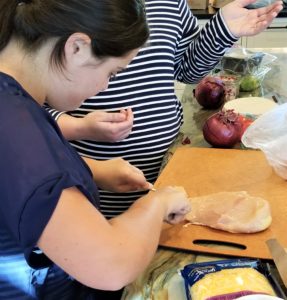 For the rest of the year, startlingly high unemployment rates for people with disabilities persists. We dream of a day when more individuals with disabilities have opportunities like this one that Sarah had, when community employers discover the gifts that individuals have to share.
For the rest of the year, startlingly high unemployment rates for people with disabilities persists. We dream of a day when more individuals with disabilities have opportunities like this one that Sarah had, when community employers discover the gifts that individuals have to share.
Before we get there, we need to understand where we have been and the milestones that advocates before us have achieved. Employers without disabilities sometimes think that there are limits to what someone with a disability can achieve, but these employers are proven wrong over and over. Over the last century, people with disabilities’ fight for employment equality has been long, hard, and limited by perception.
Beginnings of Anti-Discrimination Legislation
In the early and mid-twentieth century, only physical disabilities were eligible to receive public services and benefits for disability employment. When the Smith-Fess Act passed, the act established vocational rehabilitation for people with disabilities – but only physical disabilities.
In 1945, President Truman announced “National Employ the Physically Handicapped Week.” Later, the word “physically” was removed, making the week more inclusive in the 1960s. Eventually, this week turned into National Disability Employment Awareness Month, dedicating more time to the need for employment among the disability community.
Expansion of Civil Rights
By the ‘60s, creating inclusive spaces became increasingly important. While the courts had not caught up, President Kennedy introduced the President’s Panel on Mental Retardation. This committee explored ways that people with disabilities of all kinds could be included in every day life.
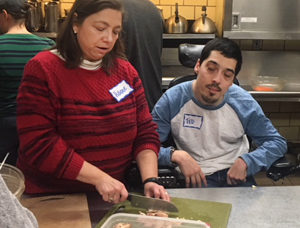 In 1972, the Independent Living Movement was born partially in response to President Nixon’s veto of the Rehabilitation Act. Later passed in 1973, the Rehabilitation Act prohibits discrimination based on someone’s disability by federal agencies and contractors. The Independent Living Movement is alive today, working to protect every individual’s right to choose where they live and how they are supported in community.
In 1972, the Independent Living Movement was born partially in response to President Nixon’s veto of the Rehabilitation Act. Later passed in 1973, the Rehabilitation Act prohibits discrimination based on someone’s disability by federal agencies and contractors. The Independent Living Movement is alive today, working to protect every individual’s right to choose where they live and how they are supported in community.
It wasn’t until 1977, when the government implemented Section 504 of the Rehabilitation Act, that people with disabilities gained civil rights. This was also when legislation acknowledged every student’s right to be in a public classroom. The precursor to supported employment, the “Try Another Way” campaign, was also born paving the path for us to where we are today.
Redefining Ability & Disability
Through the 1980s, the U.S. passed several pieces of legislation that supported individuals with disabilities’ employment prospects including the Job Training Partnership Act (1982) and the Employment Opportunities for Disabled Americans Act (1986).
The Americans with Disabilities Act was finally passed in 1990, expressly prohibiting discrimination against people with disabilities in hiring or career advancement. Since then, the perspectives of employers have been slowly evolving with the help of the federal government.
The Work Opportunity Tax Credit passed Congress in 1996, providing tax credits to businesses that hire people with disabilities. The government’s support led to an increase in community employers hiring disabled employees.
Beyond the Americans With Disabilities Act
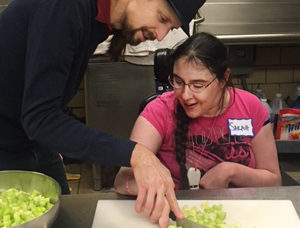 Since 1990, disability continues to be defined and redefined again. The Olmstead Act promoted community-based, independent living whenever possible. Recently, the ADA Amendments of 2008 altered the definition of “disabled” so it is easier to establish eligibility for protections.
Since 1990, disability continues to be defined and redefined again. The Olmstead Act promoted community-based, independent living whenever possible. Recently, the ADA Amendments of 2008 altered the definition of “disabled” so it is easier to establish eligibility for protections.
Since the Obama administration, the federal government’s employment agencies have supported integrated employment policies. This includes updating and improving access to services, implementing accommodations, and community outreach.
Why Should Businesses Hire People With Disabilities?
There are tons of reasons to hire individuals with disabilities, not the least of which is that they are just as capable as able-bodied employees. In fact, employees with disabilities are excellent problem solvers, stable workers (30% higher retention), safer in the workplace, and more productive.
Plus, much of the disability community is an untapped market. There are 56 million Americans with a disability of some type. The discretionary income of people with disabilities of working age alone is $21 billion. Add into this number individuals’ connections, like family and friends, and businesses realize they are missing a huge market share.
Most accommodations for employees with disabilities cost nothing. The majority of accommodations that employers pay for cost less than $500 – and this cost can be offset by the tax credit businesses receive for hiring employees with disabilities.
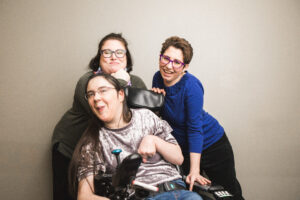 At the end of the day, there are many reasons to hire people with disabilities and very few reasons not to. Ability is not a marker of a great employee; many individuals can work successfully without accommodations while allowing a person with disabilities to grow and achieve their dream.
At the end of the day, there are many reasons to hire people with disabilities and very few reasons not to. Ability is not a marker of a great employee; many individuals can work successfully without accommodations while allowing a person with disabilities to grow and achieve their dream.
For Sarah, her apprenticeship at Piven Theatre was a big milestone. Her experience “marked the first time I had a job that wasn’t through a friend. I had to show up on time. More importantly, I had to do it for somebody else.”
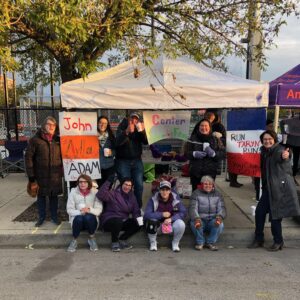 ainty filled our world in 2020 and has spilled over into 2021. When will we be able to gather together? When will we get vaccines? When will our lives feel normal again?
ainty filled our world in 2020 and has spilled over into 2021. When will we be able to gather together? When will we get vaccines? When will our lives feel normal again?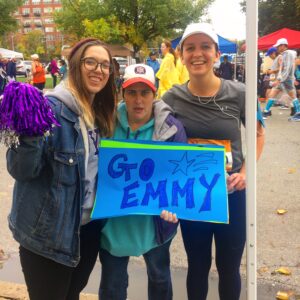
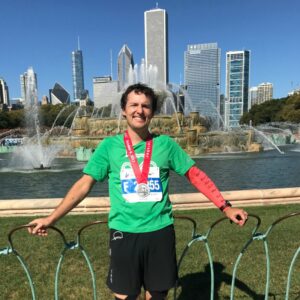 There is still time to join TeamCIF! Now isn’t the time to sit and wait. Email Joanie if you are interested in running with us. Many of our TeamCIF members are first-time marathoners, and all team members receive training support and help fundraising.
There is still time to join TeamCIF! Now isn’t the time to sit and wait. Email Joanie if you are interested in running with us. Many of our TeamCIF members are first-time marathoners, and all team members receive training support and help fundraising.
 Because of our
Because of our  Another tutor, Cynthia Witherspoon, said, “During the first week Independent Futures instituted the work from home policy I met with the participants I tutor using texts, FaceTime, and phone calls.” However, as the governor modified the stay-at-home order, “I returned to meeting in person with most of my participants in their homes. We practice safe distancing and I always wear a mask. For those who have not felt comfortable returning to face to face meetings, I stay in touch with FaceTime or phone calls.”
Another tutor, Cynthia Witherspoon, said, “During the first week Independent Futures instituted the work from home policy I met with the participants I tutor using texts, FaceTime, and phone calls.” However, as the governor modified the stay-at-home order, “I returned to meeting in person with most of my participants in their homes. We practice safe distancing and I always wear a mask. For those who have not felt comfortable returning to face to face meetings, I stay in touch with FaceTime or phone calls.”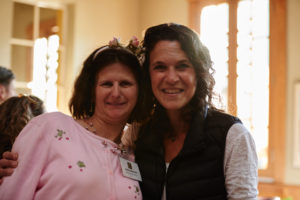 Working and tutoring remotely meant new challenges for tutors and participants. The first step was figuring out how sessions could continue. Dee Dee shared, “We have been very creative by using screen share, dictation, and new forms of learning to do daily tasks.”
Working and tutoring remotely meant new challenges for tutors and participants. The first step was figuring out how sessions could continue. Dee Dee shared, “We have been very creative by using screen share, dictation, and new forms of learning to do daily tasks.”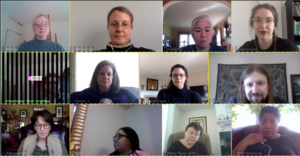 As we all adjusted slowly to the necessary COVID-19 precautions, our tutoring participants adjusted too. “At first, participants would tease me about wearing a mask and gloves, maintaining 6 feet of distance, and putting items on the ground,” Cynthia said. “Now everyone sees these as common practices, and they are respectful of the guidelines I follow. They know I am doing it to protect them.”
As we all adjusted slowly to the necessary COVID-19 precautions, our tutoring participants adjusted too. “At first, participants would tease me about wearing a mask and gloves, maintaining 6 feet of distance, and putting items on the ground,” Cynthia said. “Now everyone sees these as common practices, and they are respectful of the guidelines I follow. They know I am doing it to protect them.” 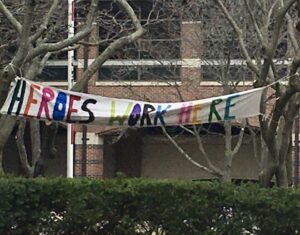 At Independent Futures, we have made tough decisions to cancel our activities through the end of April. We have also
At Independent Futures, we have made tough decisions to cancel our activities through the end of April. We have also 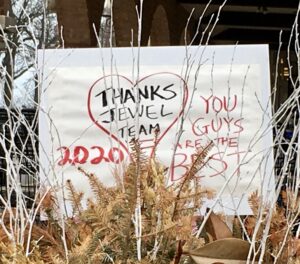 Our friends at Access Living created
Our friends at Access Living created  Together, the pair went over tips and what to expect in informational interviews. Sarah’s dream job was to be an assistant teacher. “The best I thought I could shoot for was taking tickets,” Sarah said. But then, her informational interview took a positive turn.
Together, the pair went over tips and what to expect in informational interviews. Sarah’s dream job was to be an assistant teacher. “The best I thought I could shoot for was taking tickets,” Sarah said. But then, her informational interview took a positive turn.  In 1972, the Independent Living Movement was born partially in response to President Nixon’s veto of the Rehabilitation Act. Later passed in 1973, the Rehabilitation Act prohibits discrimination based on someone’s disability by federal agencies and contractors. The Independent Living Movement is alive today, working to protect every individual’s right to choose where they live and how they are supported in community.
In 1972, the Independent Living Movement was born partially in response to President Nixon’s veto of the Rehabilitation Act. Later passed in 1973, the Rehabilitation Act prohibits discrimination based on someone’s disability by federal agencies and contractors. The Independent Living Movement is alive today, working to protect every individual’s right to choose where they live and how they are supported in community.  Since 1990, disability continues to be defined and redefined again. The Olmstead Act promoted community-based, independent living whenever possible. Recently, the ADA Amendments of 2008 altered the definition of “disabled” so it is easier to establish eligibility for protections.
Since 1990, disability continues to be defined and redefined again. The Olmstead Act promoted community-based, independent living whenever possible. Recently, the ADA Amendments of 2008 altered the definition of “disabled” so it is easier to establish eligibility for protections.  At the end of the day, there are many reasons to hire people with disabilities and very few reasons not to. Ability is not a marker of a great employee; many individuals can work successfully without accommodations while allowing a person with disabilities to grow and achieve their dream.
At the end of the day, there are many reasons to hire people with disabilities and very few reasons not to. Ability is not a marker of a great employee; many individuals can work successfully without accommodations while allowing a person with disabilities to grow and achieve their dream. 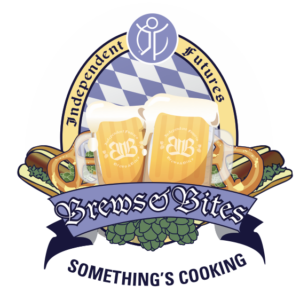 Thanks to generous donors and our wonderful community, there are many opportunities for guests at Brews & Bites to win while supporting people with disabilities in Evanston. These opportunities include 4 raffle baskets, 2 gift card trees, and a beer & wine pull.
Thanks to generous donors and our wonderful community, there are many opportunities for guests at Brews & Bites to win while supporting people with disabilities in Evanston. These opportunities include 4 raffle baskets, 2 gift card trees, and a beer & wine pull. 
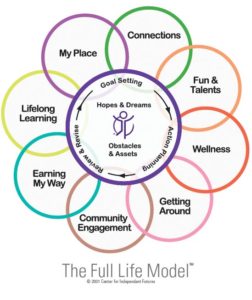 This year, the gift card tree will represent our Full Life Model. The model guides our work as tutors support participants in learning the life skills necessary to live independently. The 8 circles represent areas of a full life, which the leaves of the gift card trees will also represent.
This year, the gift card tree will represent our Full Life Model. The model guides our work as tutors support participants in learning the life skills necessary to live independently. The 8 circles represent areas of a full life, which the leaves of the gift card trees will also represent. 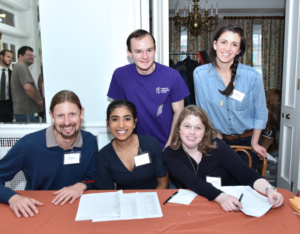 This year there are two ticket levels: regular adult tickets & young adult tickets. The difference between these two are the number of drink tickets allotted and pricing. While adult ticket purchases come with 9 drink tickets, the young adult tickets receive 3.
This year there are two ticket levels: regular adult tickets & young adult tickets. The difference between these two are the number of drink tickets allotted and pricing. While adult ticket purchases come with 9 drink tickets, the young adult tickets receive 3. 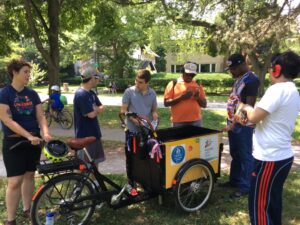 Let’s begin with an understanding of what Independent Futures considers ‘critical life skills.’ These are the skills that we need to live independently, like cooking, cleaning, and being safe.
Let’s begin with an understanding of what Independent Futures considers ‘critical life skills.’ These are the skills that we need to live independently, like cooking, cleaning, and being safe. 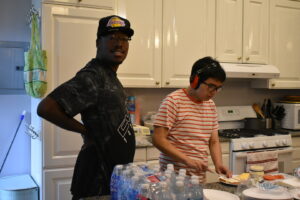 The Transition House travelers explored a lot of Evanston, including the Evanston Public Library South Branch, parks, Andy’s Custard, Dave’s Down to Earth Rock Shop, Evanston Police Department, and more.
The Transition House travelers explored a lot of Evanston, including the Evanston Public Library South Branch, parks, Andy’s Custard, Dave’s Down to Earth Rock Shop, Evanston Police Department, and more.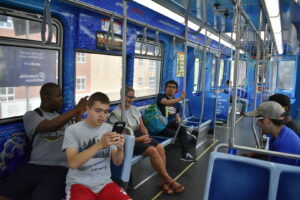 While exploring Evanston, the students were able to see what their own futures could hold. One of our community members, Lindsay, spoke with the group about what her life is like. Living independently in an apartment, Lindsay volunteers, has a job, goes out with close friends, and is engaged. Lindsay’s life is the type of full life that many of our community members have, and it’s a positive example of the life the Travel the Town students could have.
While exploring Evanston, the students were able to see what their own futures could hold. One of our community members, Lindsay, spoke with the group about what her life is like. Living independently in an apartment, Lindsay volunteers, has a job, goes out with close friends, and is engaged. Lindsay’s life is the type of full life that many of our community members have, and it’s a positive example of the life the Travel the Town students could have.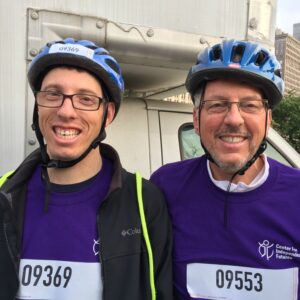 “We’re going to start from downtown and go all the way to Sheridan this year. That’s 15 miles,” Caleb explains. “Plus, me and my dad’s church friend wanted to accompany us this year. We’ve been talking to him about it, and he decided this is the year to do it!”
“We’re going to start from downtown and go all the way to Sheridan this year. That’s 15 miles,” Caleb explains. “Plus, me and my dad’s church friend wanted to accompany us this year. We’ve been talking to him about it, and he decided this is the year to do it!”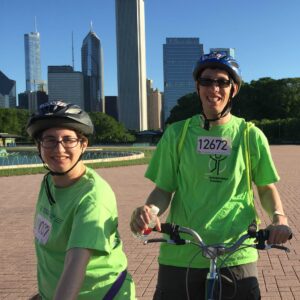 Caleb is preparing for his 15-mile bike ride with longer rides, especially since the weather is finally getting warmer. But first, he needed to get his bike checked out at Wheel & Sprocket after the long winter. This year it was time for some upgrades for Caleb’s light gray Giant Revel bike. “I had to install new wheels because my old fat tires were getting hard to lock up outside my apartment, so I got thinner ones.” Caleb continued, “My bike seat was old and it kept getting loose. The bicycle people said I should get a new seat. It would just slip out, and I couldn’t deal with that anymore!”
Caleb is preparing for his 15-mile bike ride with longer rides, especially since the weather is finally getting warmer. But first, he needed to get his bike checked out at Wheel & Sprocket after the long winter. This year it was time for some upgrades for Caleb’s light gray Giant Revel bike. “I had to install new wheels because my old fat tires were getting hard to lock up outside my apartment, so I got thinner ones.” Caleb continued, “My bike seat was old and it kept getting loose. The bicycle people said I should get a new seat. It would just slip out, and I couldn’t deal with that anymore!”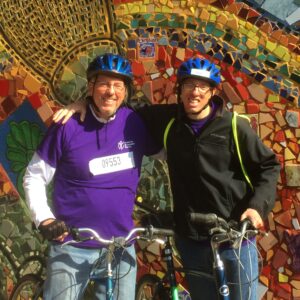 The Dream Team fundraises every year to support activities Independent Futures provides like Bike Club. Every dollar donated helps to keep our activities calendar full of exciting events. If
The Dream Team fundraises every year to support activities Independent Futures provides like Bike Club. Every dollar donated helps to keep our activities calendar full of exciting events. If  On Tuesday, November 27th, countries around the world celebrated #GivingTuesday. In Illinois, we also participate in #ILGive, an
On Tuesday, November 27th, countries around the world celebrated #GivingTuesday. In Illinois, we also participate in #ILGive, an  As if raising more than $24,000 in one day wasn’t exciting enough, we were also offered a matching grant opportunity. For every donation of $175 or more, we received an additional $175 thanks to the Coleman Foundation. As a result, Center for Independent Futures will receive an additional $10,000!
As if raising more than $24,000 in one day wasn’t exciting enough, we were also offered a matching grant opportunity. For every donation of $175 or more, we received an additional $175 thanks to the Coleman Foundation. As a result, Center for Independent Futures will receive an additional $10,000! 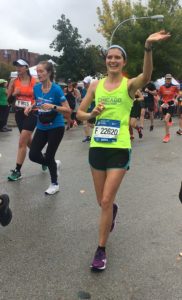 On October 13, 2019, thousands of dedicated runners will line up at Grant Park, ready to take on the
On October 13, 2019, thousands of dedicated runners will line up at Grant Park, ready to take on the 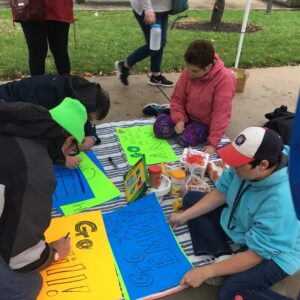 Of course! There is room for spectators along the whole course, but Mile 15 is really where the party’s at. At Mile 15, there is the Charity Block Party, where cheerleaders from charity partners like Center for Independent Futures will be waiting to cheer on our team — and all the other runners, of course! Your friends and family are always welcome to join us at the block party!
Of course! There is room for spectators along the whole course, but Mile 15 is really where the party’s at. At Mile 15, there is the Charity Block Party, where cheerleaders from charity partners like Center for Independent Futures will be waiting to cheer on our team — and all the other runners, of course! Your friends and family are always welcome to join us at the block party!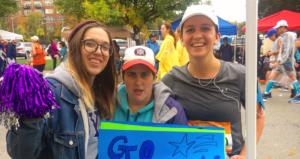 It’s easy! Just email team coordinator
It’s easy! Just email team coordinator 


